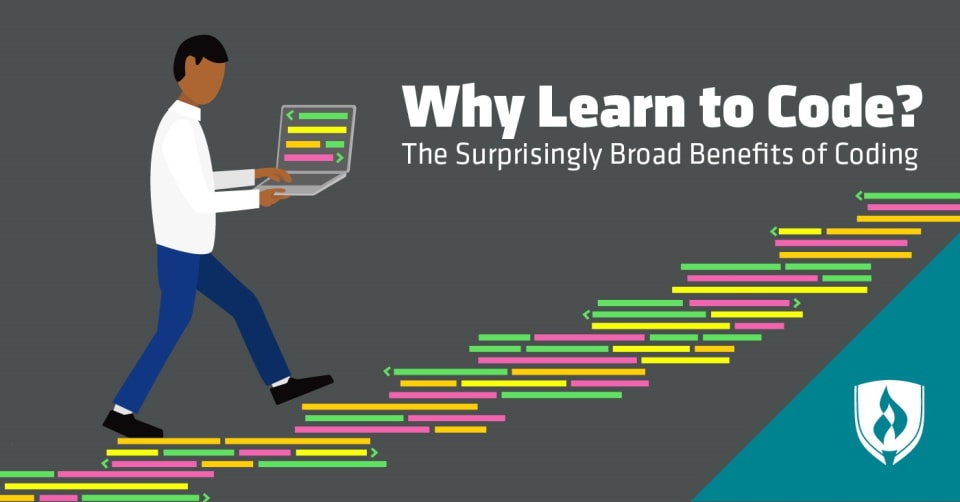
It wasn’t long ago that coding was seen by many as an odd hobby for geeks tinkering with computers in their basements. But over the past several years, coding has progressed from a hobby to a critical career skill. Even better for those hobbyists? Employers have shown a willingness to pay a premium for the work of employees with coding and programming ability.
Knowing this, you might be wondering if coding is something you should consider. But there are still a lot of questions to be answered. How long does it take to learn to code? Why should I learn to code? We asked professionals from a wide variety of careers to help answer your questions and share their thoughts on the benefits of learning to code. Whether you’re a marketer, a mom, a business owner, or just curious about the craft, we’re ready to convince you why coding is an important skill worth adding to your toolbox.
Why learn to code? 5 Surprising benefits to consider
The benefits of learning to code can be surprisingly wide-ranging. Here are a few of the ways learning to code can benefit you.
1. Demand remains strong for coding-related jobs
What good is a strong salary if no one is looking to hire for the position? When it comes to coding-related jobs, it appears there’s still plenty of opportunity.
Here are the current BLS projections for employment growth in the same coding and programming-related professions:
- Web developers: 13%
- Network and computer systems administrators: 5%
- Computer programmers: -7%
- Database administrators: 9%
- Software developers: 21%
When compared to the national average of five percent growth, you can see that a handful of positions are outpacing a lot of other careers. Computer programmers are an interesting outlier from this group, but some believe these projections are influenced by computer programming skills blending into other related in-demand tech roles.
While the role is still extremely valuable, more and more hybrid positions are being introduced into the workforce. This has resulted in less “computer programmer” job postings, and more opportunities that combine programming skills into other job titles.
2. Coding ability gives new perspective to problem-solving
“Learning to code has the inadvertent effect of teaching you how to think,” says Adrian Degus, CEO of Nuvro. He goes on to explain that he used to be more prone to solving problems emotionally. But his coding experience has taught him to approach problems logically.
“Understanding logic, at a deep level, has improved my problem-solving proficiency tenfold,” he adds.
Coding, in its most basic terms, is really just assigning a computer a task to do based on the logical guidelines you’ve outlined. Highly complex tasks are essentially a collection of smaller operations once you break them down. This methodical and logic-heavy approach to problem solving can be a boon for figuring out problems beyond a coding challenge.
Hilary Bird, senior developer at Get CenturyLink, agrees with this sentiment, saying learning to code has benefited her personal and professional life by encouraging her to take a step back and approach situations from a new perspective. “I can break problems down into small, separate parts and figure out how each is affecting the other,” she explains. “This helps me decide what area of the problem to focus on first.”
3. Learning to code offers career flexibility
Learning to code can help open up new areas of opportunity in your career and ultimately make you a more flexible candidate in a rapidly-shifting digital economy. Daniel Davidson, owner of Dan Design Co., started his career in print design but noticed he was consistently missing out on opportunities due to a lack of coding knowledge.
“The single greatest skill I have picked up for my professional life has been learning how to code,” Davidson says. “Had I not learned to code, I would have been out of work years ago. It’s been liberating and very lucrative.”
Davidson adds that even if your job doesn’t require you to have a deep understanding of coding or programming languages, it still helps because you’ll likely need to interact with another person who does. Learning to code, even as a hobby, can give you a common reference point and better understanding of those who tackle some of the more complex programming and coding roles out there.
4. Learning to code can be a fun bonding opportunity for families
How often do you have the opportunity to learn something practical and new with your kids? Parents with school-aged children have the chance to start from square one together as they learn the fundamentals of programming and coding.
“My 10-year-old son actually decided to learn to code around the same time I did,” Degus says. “It was a challenging but very rewarding experience. To this day my son and I talk coding over the dinner table, while the rest of the family makes fun of us for being geeks.”
Christopher Prasad, marketing manager at JookSMS, points out that involving your kids can be a great way to keep yourself accountable as well as teach them important skills as the value of coding will only increase.
“Schools in the UK have now actually introduced coding to younger children so they know what it takes to design apps, websites and more, and I think it's a brilliant idea going forward and developing the younger generation,” he says.
One excellent way to test the waters of learning to code is to practice with kid-friendly resources like Scratch, which gives both you and your child an introduction to programming fundamentals and systemic reasoning. This fundamental understanding will help you as you move on to more complex languages and applications.
5. Coding can be useful in jobs you might not expect
You might think coding and programming skills are only valuable for people working in highly technical specialist jobs. While it’s true that learning to code is more important for some roles, that doesn’t mean you can’t find practical ways to apply coding knowledge in non-coding jobs.
Software architect and entrepreneur Mark Billion says his coding knowledge has benefited him in unexpected ways as a business professional.
“We were able to use Python to code our advertising algorithms, which also saved us about $1,000 per month,” Billion explains. “So, if you are in business—any kind of business—coding is critical.”
The ability to code allowed Billion to automate menial tasks that ultimately saved him money. That’s a huge plus for small businesses where budgets are typically very tight.
For those who work closely with programmers and developers, learning the basics of coding can make you a much more valuable member of a team.
“While I’m primarily a marketer, having technical knowledge is one of the biggest assets I can provide my team,” says Jake Lane, growth manager at Press Cleaners. “Being able to make a change to the code base helps free up our developers to focus on the more important stuff and reduces development lag time.”
You don’t have to be a programming whiz to reap the benefits of learning to code. Knowing just enough to be useful can still be a positive asset in most business environments.
Putting coding skills to work
Why learn to code? As you can see, there are plenty of good reasons why coding is important. Whether it’s just for fun or as a form of professional development, you’re sure to enjoy the benefits of learning to code as you build a foundation of tech skills.
But you still need to know—how long does it take to learn to code? To answer this question, you’ll need to determine what kind of coding career you want to pursue. By exploring your career options, you can also find more reasons that answer—why should I learn to code? To discover promising roles in our digital economy, read our article, “9 Programming Careers for Coding Connoisseurs.”
1Bureau of Labor Statistics, U.S. Department of Labor, Occupational Outlook Handbook, [accessed July, 2020] www.bls.gov/ooh/. Information represents national, averaged data for the occupations listed and includes workers at all levels of education and experience. This data does not represent starting salaries. Employment conditions in your area may vary.
EDITOR'S NOTE: This article was originally published in 2017. It has since been updated to include information relevant to 2020.




